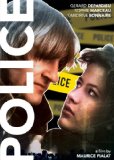| Reviews & Columns |
|
Reviews DVD TV on DVD Blu-ray 4K UHD International DVDs In Theaters Reviews by Studio Video Games Features Collector Series DVDs Easter Egg Database Interviews DVD Talk Radio Feature Articles Columns Anime Talk DVD Savant Horror DVDs The M.O.D. Squad Art House HD Talk Silent DVD
|
DVD Talk Forum |
|
|
| Resources |
|
DVD Price Search Customer Service #'s RCE Info Links |
|
Columns
|
|
|
Police
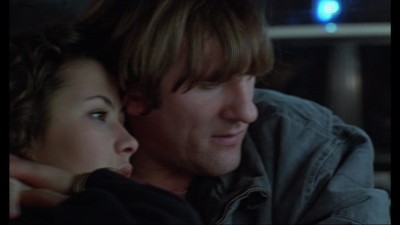
The late Maurice Pialat (À nos amours, L'Enfance nue) was a special sort of enfant terrible of French cinema (which had no shortage of such), the sort of uncompromising, singular figure that you wouldn't expect to be impressed by much of anything. His cinematic quest for a certain kind of authenticity has gotten him labeled the "French Cassavetes" on more than one occasion, and the comparison is apt: Like the notoriously finicky/Method-y American independent filmmaker, he's generally much more drawn to creating moments for his films that seem real, authentic, spontaneous, using his actors/characters to reveal some emotional truth, than in anything that simply introduces plot or moves it along. This leads to films that would seem to have gaps if they weren't so whole in that emotional sense; the types of journeys his characters go on (one especially shining example being Sandrine Bonnaire's adolescent girl in À nos amours) are satisfyingly complete as what they are, consisting of complex and quite dramatic slices of life unfettered by story-bound cause-and-effect. Unfortunately, it's this very thing Pialat has proven to be so good at that shows up Police, his 1985 film starring Gerard Depardieu and Sophie Marceau, as ultimately a misstep -- a meandering into something he's not so good at, an interesting and quite understandable attempt to see if he can encompass a very stalwart old movie genre (the jaded-or-is-he urban policeman/jaded-or-is-she femme fatale story) with his own idiosyncratic brand of character study/development, with the resulting film standing as an overall unsuccessful experiment, a "no, but nice try" response to the intriguing aesthetic questions and challenges Pialat is posing with it.
Det. Louis Mangin (Depardieu) is part of the Paris police vice squad in a very lived-in, run-down, non-tourist-oriented arrondissement, working in an institutional, anonymous, fluorescent-lit bureau whose revolving door sucks in and spits out a nonstop parade of prostitutes, pimps, petty thieves, and drug dealers, and whose ultra-bland desk-and-tile décor sometimes gets a startling splash of color from blood spilled by the perps Mangin roughs up out of nowhere when he's in a particularly bad mood. Mangin's bad-cop persona starts where even Jimmy Doyle might have drawn some kind of line: He's accepted absolutely the concept that criminals and cops are two sides of the exact same coin, and he behaves accordingly, routinely using violent, underhanded, coercive and otherwise "extralegal" methods and counting as his best friend a lawyer, Lambert, (the perfectly weasely Richard Anconina) whose work seems to consists entirely of getting the offenders Mangin pursues with such contempt and brutality off the hook; that revolving door, in other words, is spun by Mangin and his comrades.
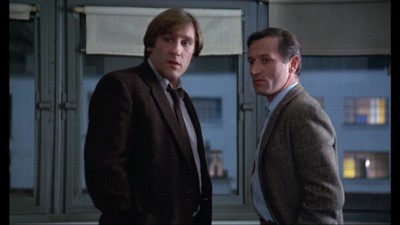
As the film opens, Mangin is browbeating a drug dealer's associate into betraying his circle of colleagues, all non-native French (from Tunisia, adding the nonchalant xenophobia of the cops to the standard, detestation undergone by anyone in custody). The consequent bust leads only to more of the same grim, sleazy interrogation and prosecution techniques Mangin engages in cavalierly and without blinking, but he turns up something that draws more genuine attention than the slippery suspect with a suspiciously large wad of francs: a girl called Noria (Marceau) who's been hanging around and living with this dealer as his girlfriend. Noria is a runaway from the provinces, a self-styled femme fatale and white outsider slumming in an Arabic-immigrant world who means to milk it for all the easy living and dough she can before slipping out when the traditional, fundamentalist-Islamic gender roles get too tough (as she points out casually later in the film, the kind of "mainstream"-French, non-religious man Mangin is has more devious ways of enforcing just the same pattern of gender restrictions). Noria is savvy, but she's in over her head; part of the film's criminal milieu is an underworld of pimps and prostitutes -- one of whom, Lydie, is played by Sandrine Bonnaire, giving a fine performance in a small role -- that Noria could find herself booted into at any moment, and the guys Noria is involved with there believe that a woman is either virginal or a whore, with any disloyalty to those strict roles severely punished. This is why it's so foolish for her to take a certain traitorous, self-interested action against the little cartel when the opportunity presents itself, and why it's so dangerous that there's a spark between her and Mangin, which flares while the dealer boyfriend is locked up, and which, for some fleeting, snatched-on-the-fly moments together, seem to strip away their layers and layers of self-protective opportunism and cynicism. Mangin falls in love with her, and that love seems to be genuinely reciprocated.... But could Noria's unflagging instinct for self-preservation (i.e., refusal to love or attach herself to anything, eyes permanently on the prize) and the very narrow roles their situation makes available to them (as a man and as a woman, and in their particular time, place, and station), ever allow them to escape into each other's arms?
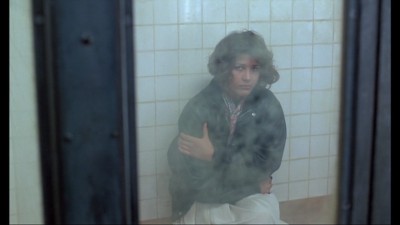
At its best, this policier/noir, done Pialat style, captures that cool, existential doom, forever bordering on (and breaking resignedly through to) tragedy, one sees in the later films of Jean-Pierre Melville. This comes in part from the unflinchingly realist cinematography and production design of, respectively, Luciano Tovoli (Suspiria) and Constantin Mejinsky, which capture every neon-lit, cracked-and-grimy institutional/low-life detail of dejected and rundown lives in Paris streets, bars, flats, police stations, and holding cells. In even larger part, though, the film owes its not-infrequent flashes of brilliance to Pialat's bold, brilliant elision of "action" in favor of the characters' emotional experiences and evolutions: The pivotal beating of Noria's brother at the hands of her criminal associates is never shown; Mangin's grown daughters (by a dead wife) are mentioned, a part of his life, but appear not to exist in any real way for him, so they are omitted from the screen; the seemingly desperate importance of Mangin's breaking the case against the drug gang wide open just fades out (as do Mangin's relations with Bonnaire's prostitute and Noria's own business-pleasure mixing with Lambert), becoming less and less important as the possible hidden, true natures of Mangin and Noria come to the fore, revealing themselves as the film's truly urgent matters. Just as often, though, Police's focus is not enhanced in such a clever way, but simply lost: Things seem to be picked up and then forgotten about, in particular a very prominent subplot involving a female partner of Mangin's (Pascale Rocard) who's about to make lieutenant, and the very awkward integration of any female person or "feminine" behavior into the police station (a much butcher female officer gets on much better with the drunken, back-slapping boy's club). One gets the feeling that this is much more screenwriter Breillat's concern than one shared by Pialat; Breillat's own film of a few years later, Dirty Like An Angel, would mine the exact same strange brew of femininity and police work, the disruptive influence of the former on the latter, for much richer and sharper results. In Police, however, the matter is a bit of an albatross; Pialat's lack of deeper involvement in it is palpable, and so it just sits there, very prominently but not very engagingly, before trailing off, and we'd never miss it if it weren't there. The same goes for most of the over-elaborated backstory involving Noria's immigrant/criminal cohorts, which opens a door onto a world of immigrants in France (a theme touched on quite wonderfully by filmmakers as diverse as Mathieu Kassovitz (La Haine) and Claire Denis (I Can't Sleep, 35 Shots of Rum)), but then just wanders away, leaving us to wonder why so much time is spent on it if not for cheap sensationalism one presumes Pialat to be above, the sort of thing that trades in quasi-racist exploitation of a "dangerous" element for cinematic thrills that never materialize here, anyway.
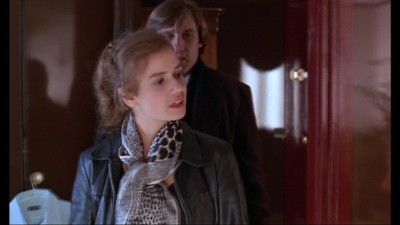
Many of the scenes between Depardieu and Marceau are very finely scripted, shot, and acted, but elsewhere, Police feels like an unnecessary star vehicle concocted for Depardieu to show how actorly, DeNiro-style, he can be. (How much better would the film have been had it spent much less time dissecting the predictable macho brutality of Mangin and much more showing us the whys and wherefores of the more interesting character of Noria?) Pialat's attempt to add to his palette is admirable, but he just doesn't do star vehicles or films in overly plot-beholden genres, as becomes painfully clear with the overabundance of more or less contrived Depardieu "moments" and lackluster, obligatory scenes of narrative elaboration. Those artificial (though always realistically played) scenes jostle continuously with the ones Pialat actually seems to care about, where his own vision and skills shine, as in the penultimate interaction where Mangin is called into a bar by an innocent suspect we have previously seen him brutalize, just for a beer and a chat (both men have different roles here in the social world than they did at the station, and the acceptance of that, the ease of transition for both of them, is amazing, touching, and sort of appalling); or the final close-up, where Mangin's self-compromising salvation of Noria has resulted in nothing more than him having served his purpose and in the process made himself vulnerable, open while she remained hard and closed -- a silent realization, with beautiful acting from Depardieu, set to Gorecki's "Symphony of Sorrowful Songs." (That's the only bit of non-diegetic music heard in the entire film; it's a rousing and harrowing conclusion, and makes you believe for a moment that you are watching something great...until you remember all the rest.) Police is in the end a mess and a mixed bag, but something diamond-sharp, some hint of what Pialat might have been able to do had he honed things down all the way to where his interest truly lay, does glimmer through quite often, enough of the time to tentatively recommend the picture, despite the multiple snags and problems that keep it from ever hitting a stride and achieving the ambitions Pialat has realized elsewhere in his filmography with noticeably more potency and discernment.
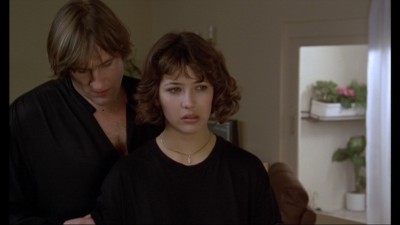
THE DVD:
On the plus side, although the packaging indicates that Police is presented at an (incorrect) aspect ratio of 1.78:1, it is actually the packaging that's incorrect, and the film appears on this DVD at its original, correct aspect ratio of 1.66:1. On the minus side, the picture quality is mediocre at best; I spotted more edge enhancement than is really passable, and the overuse of digital noise reduction leads to a less dimensional and textured look than the film should rightfully have.
Sound:The Dolby Digital 2.0 stereo soundtrack is quite good; there's only dialogue and room/ambient sound to consider (except for the end credits), and the sound quality here, though it probably could have been a little more finessed (there's a very slightly muffled quality to it overall, though that's not too distracting or even all that noticeable), is sufficient to conveying the film's restrained sound design, with no more critical sonic flaws like distortions, static/hiss, or imbalance.
Extras:None.
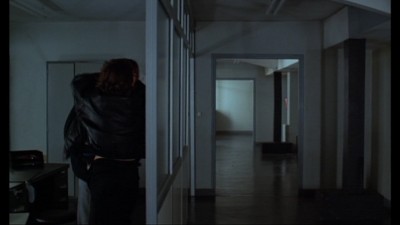
An intriguing experiment that has more than a few compelling moments discernible through the murk, Maurice Pialat's Police ultimately has its personality too divided and pulls itself in too many directions to amount to all that much. Pialat's usual highly personal, Cassavetes-like (in principle, if not precisely in practice) cinematic search for authenticity doesn't so much mesh with the genre trappings of his detective/femme fatale story (with Gerard Depardieu as the detective, Sophie Marceau as the seductress) as it creates oil-and-water, parallel/alternating paths, both too often detoured and neither followed with as much dedication as they should be. (Nor, more surprisingly, does Pialat's sensibility complement that of his screenwriter here, Catherine Breillat, an enfante terrible filmmaker in her own right whose specific interest in this story and these characters seem compartmentalized, bracketed off from Pialat's, making for an even more diluted, stretched-thin feel.) That's not to say that Police is a bad film, but it is too compromised to be considered anything other than a minor, noble-failure work from a major filmmaker who has much better in him. The places it sometimes goes, the built-up desolation released in its final image are certainly moving, but as Pialat demonstrates in his better-achieved films (À nos amours, for one) -- and even going just by the not-infrequent displays of inspired scenes and sequences mixed in here -- you know that merely intermittently moving us falls short of the filmmaker's fullest ability to shatter, devastate, and transport. Recommended.
|
| Popular Reviews |
| Sponsored Links |
|
|
| Sponsored Links |
|
|
| Release List | Reviews | Shop | Newsletter | Forum | DVD Giveaways | Blu-Ray | Advertise |
|
Copyright 2024 DVDTalk.com All Rights Reserved. Legal Info, Privacy Policy, Terms of Use,
Manage Preferences,
Your Privacy Choices | |||||||









